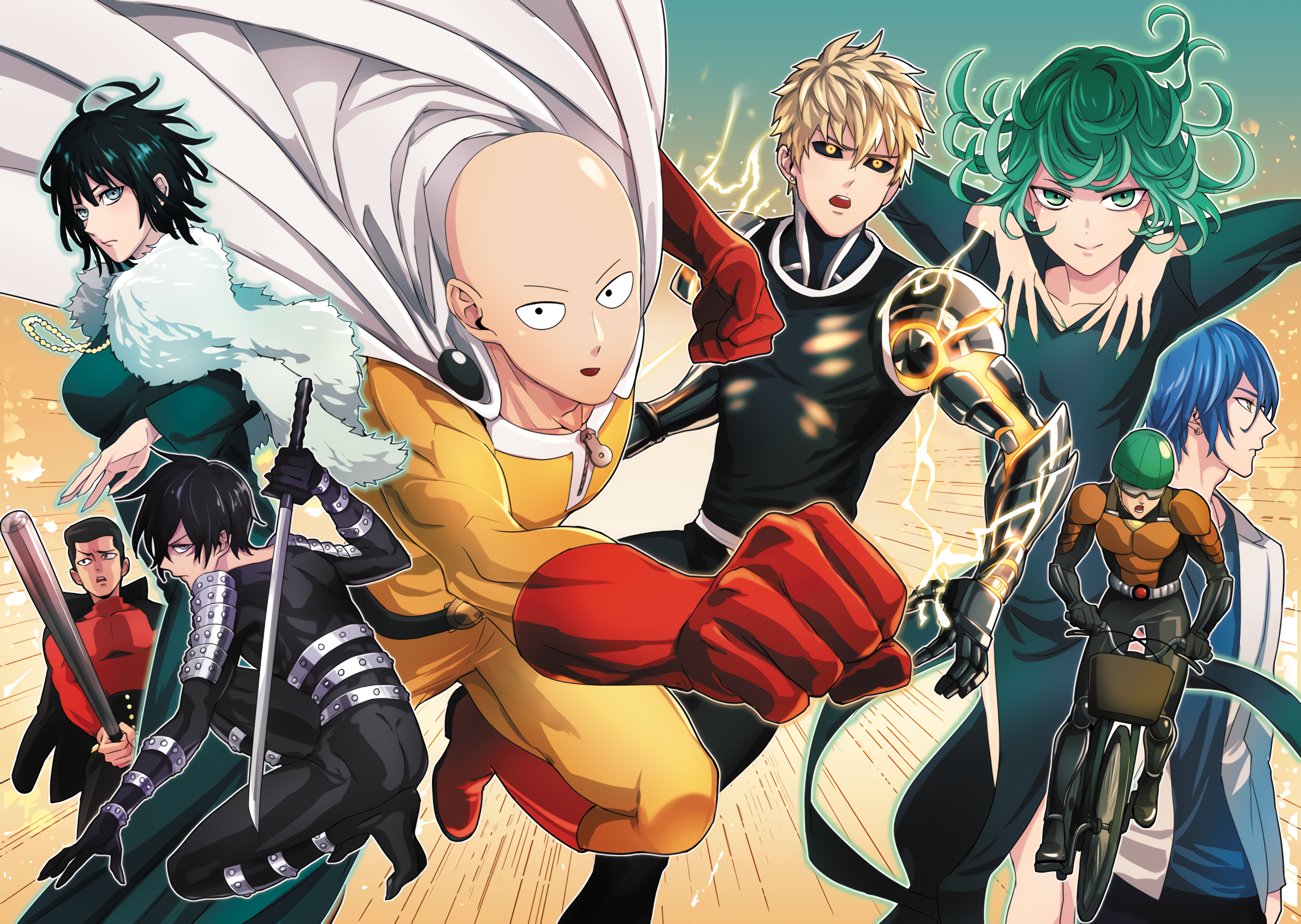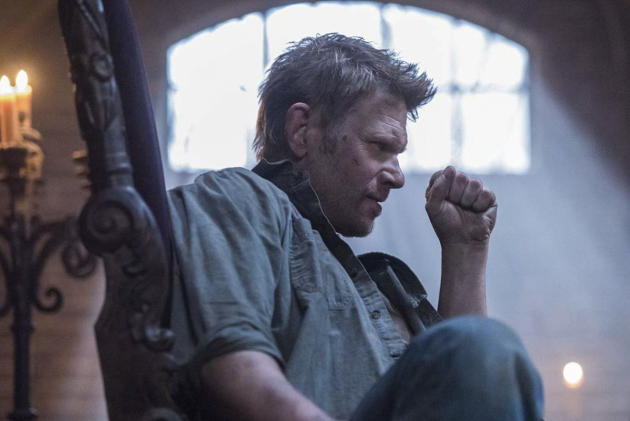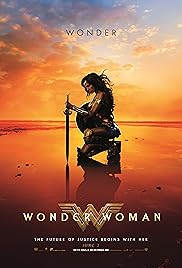Supernatural, season 12 (2016-2017)
In its dozenth (I just made that a word) season, Supernatural maintains a steady pace, if not exactly reaching the heights of its peak years in seasons 2 through 5.
At the end of season 11, Sam and Dean had once again thwarted Earth's destruction, this time by reuniting God with his long-lost sister, The Darkness. This sent the sibling deities off into the sunset, also leaving behind Sam and Dean's mother, whom God had resurrected as thanks.
Season 12 sets things up fairly quickly. Lucifer has managed to get out of his cage once again. However, being rather weak, he is hopping from one human vessel to the next, wreaking any havoc that he can in a rage against not having his father, God, around to torment any more. As Sam and Dean try to track down Satan, they also meet members of the British Men of Letters, who combat monsters using much more calculating and unforgiving methods. As the Winchesters first deal with the Men of Letters, Lucifer manages to impregnate a woman with what is known as a "Nephilim" - a half-angel/half-human abomination which has the potential to destroy everything on Earth. These two primary plot points converge when the British Men of Letters decide to exterminate all American hunters just as Lucifer escapes his bonds and attempts to oversee the birth of his unholy son.
This season was a decent one that is among the stronger batch of the post-season 5 bunch. That said, my enthusiasm for the show has waned enough that I'm not completely sure that I'll go out of my way for next season. Perhaps only now, after a full seven seasons which have failed to fully return to the excitement that I had during the show's outstanding first five, I think I'm ready to turn the page and leave it behind. Part of this is because this season was actually solid, by its own standards, but still wasn't enough to stoke complete enthusiasm in me.
And still, some quintessential elements continue to be lacking. Using Lucifer as a primary nemesis again simply feels like treading water and going over old ground. And not doing it particularly well. The original incarnation of Lucifer was such a fantastic, slow-burn over the course of nearly three seasons, and it had no small amount of menace and tragedy surrounding it. And when the Morning Star was finally able to appear in his full glory, there was a terrifying power to it. Now, however, Lucifer is often not much more than a sarcastic counter-point to Crowley. Sam Pellegrino can certainly play snarky and sarcastic very well, but I've never felt that it was the best fit for the original vision that this show had of Lucifer - one of the most calculating, powerful, and awesome figures in the entire mythology. This season simply uses him mostly as another comedy piece, for the most part.
This is one of a few signals to me that the show-runners are spinning their wheels a bit. Yes, they are doing it well in ways that are usually true to the main characters and that are often satisfying to long-time fans. But the show doesn't seem to be willing to push any more boundaries or really shake anything up anymore. Because Misha Collins and Mark A. Shepperd are attractive presences, they are simply never going to be killed off (even when their characters have deserved it time and time again). These and some other aspects of the show have become, in my view, just stale enough that I may just leave it alone from this point.
One-Punch Man, season 1 (2015)
I haven't watched a Japanese anime series in ages. Back in my high school and college days, I absolutely loved the classic movies like Akira, Fist of the North Star, Vampire Hunter D, and several others. And when I lived and worked in Japan for a couple of years, I used the popular kids' show One Piece to improve my Japanese language skills to an extent. That was nearly 15 years ago now, and I haven't watched an anime TV series since. So imagine my surprise when the ol' Netlflix algorithm kept suggesting this unknown mini-series from the Land of the Rising Sun.
Less than two minutes into the first episode, my attention was firmly grasped. By the end of the 23-minute pilot, I was chomping at the bit to convince my wife, who enjoys the odd anime show here and there, to watch it with me the next day. She did, and we were both fairly well hooked.
The show follows Saitama, a virtually unstoppable force of heroism. Thanks to rigorous training, Saitama has acquired strength and speed that allow him to fell the mightiest of evil foes with literally no more than a single blow. Sounds great, right? Well, Saitama's problem is that his domination over the forces of evil has done nothing to assuage the deep depression and apathy which he feels. For him, defeating a 500-foot tall, city-destroying monster is no more satisfying than eating a bowl of tepid ramen for breakfast. Herein lies more than a little of the show's humor. As he effortlessly crushes immensely powerful enemies, Saitama is often mentally checked out and lost in existential musings about the purpose of it all. He sometimes even spends these short, one-sided battles lamenting the fact that he has missed a sale at his local grocery store, or pondering some other mundane daily task.
This aspect of the humor runs through other elements of the show, as well. One-Punch Man relishes the opportunity to parody and mock the many silly tropes of fantasy superhero (and especially anime) stories. Whether it's the exhausting expositional monologues, the tired origin stories, or characters calling out the names of their signature "super moves" while in the middle of combat, the barely-engaged Saitama has no time for any of it. His effortless and apathetic domination of foes who are putting in maximum effort to both fight and posture only frustrates his enemies all the more, providing yet more solid humor. Series creator and writer, known only as "One," uses the show to perfectly balance his love of anime tropes with wonderfully lampooning the silly names, costumes, and braggadocio almost always found in the genre.
Much to my delight, there is actually a really entertaining, rollicking arc to the show. It's not completely tight or serialized, but there is continuity from one episode to the next, and it culminates in a three-episode multi-parter that builds towards some really fun fights between heroes and monsters of various freakish abilities. It actually gave me flashbacks to when I would watch those aforementioned classic anime movies from the '80s and '90s and really enjoy the epic battle scenes between fantastically powered beings.
This was a great find, and one I'd recommend to anyone who's ever enjoyed anime. I'm not completely sure of how the second season (already announced) could live up to this first one, but I'm more than willing to tune in and find out.
In its dozenth (I just made that a word) season, Supernatural maintains a steady pace, if not exactly reaching the heights of its peak years in seasons 2 through 5.
At the end of season 11, Sam and Dean had once again thwarted Earth's destruction, this time by reuniting God with his long-lost sister, The Darkness. This sent the sibling deities off into the sunset, also leaving behind Sam and Dean's mother, whom God had resurrected as thanks.
Season 12 sets things up fairly quickly. Lucifer has managed to get out of his cage once again. However, being rather weak, he is hopping from one human vessel to the next, wreaking any havoc that he can in a rage against not having his father, God, around to torment any more. As Sam and Dean try to track down Satan, they also meet members of the British Men of Letters, who combat monsters using much more calculating and unforgiving methods. As the Winchesters first deal with the Men of Letters, Lucifer manages to impregnate a woman with what is known as a "Nephilim" - a half-angel/half-human abomination which has the potential to destroy everything on Earth. These two primary plot points converge when the British Men of Letters decide to exterminate all American hunters just as Lucifer escapes his bonds and attempts to oversee the birth of his unholy son.
This season was a decent one that is among the stronger batch of the post-season 5 bunch. That said, my enthusiasm for the show has waned enough that I'm not completely sure that I'll go out of my way for next season. Perhaps only now, after a full seven seasons which have failed to fully return to the excitement that I had during the show's outstanding first five, I think I'm ready to turn the page and leave it behind. Part of this is because this season was actually solid, by its own standards, but still wasn't enough to stoke complete enthusiasm in me.
And still, some quintessential elements continue to be lacking. Using Lucifer as a primary nemesis again simply feels like treading water and going over old ground. And not doing it particularly well. The original incarnation of Lucifer was such a fantastic, slow-burn over the course of nearly three seasons, and it had no small amount of menace and tragedy surrounding it. And when the Morning Star was finally able to appear in his full glory, there was a terrifying power to it. Now, however, Lucifer is often not much more than a sarcastic counter-point to Crowley. Sam Pellegrino can certainly play snarky and sarcastic very well, but I've never felt that it was the best fit for the original vision that this show had of Lucifer - one of the most calculating, powerful, and awesome figures in the entire mythology. This season simply uses him mostly as another comedy piece, for the most part.
This is one of a few signals to me that the show-runners are spinning their wheels a bit. Yes, they are doing it well in ways that are usually true to the main characters and that are often satisfying to long-time fans. But the show doesn't seem to be willing to push any more boundaries or really shake anything up anymore. Because Misha Collins and Mark A. Shepperd are attractive presences, they are simply never going to be killed off (even when their characters have deserved it time and time again). These and some other aspects of the show have become, in my view, just stale enough that I may just leave it alone from this point.
 |
| He's not exactly the most intimidating hero, but Saitama's domination has bored him into an apathy usually reserved for teenagers and French philosophers. |
I haven't watched a Japanese anime series in ages. Back in my high school and college days, I absolutely loved the classic movies like Akira, Fist of the North Star, Vampire Hunter D, and several others. And when I lived and worked in Japan for a couple of years, I used the popular kids' show One Piece to improve my Japanese language skills to an extent. That was nearly 15 years ago now, and I haven't watched an anime TV series since. So imagine my surprise when the ol' Netlflix algorithm kept suggesting this unknown mini-series from the Land of the Rising Sun.
Less than two minutes into the first episode, my attention was firmly grasped. By the end of the 23-minute pilot, I was chomping at the bit to convince my wife, who enjoys the odd anime show here and there, to watch it with me the next day. She did, and we were both fairly well hooked.
The show follows Saitama, a virtually unstoppable force of heroism. Thanks to rigorous training, Saitama has acquired strength and speed that allow him to fell the mightiest of evil foes with literally no more than a single blow. Sounds great, right? Well, Saitama's problem is that his domination over the forces of evil has done nothing to assuage the deep depression and apathy which he feels. For him, defeating a 500-foot tall, city-destroying monster is no more satisfying than eating a bowl of tepid ramen for breakfast. Herein lies more than a little of the show's humor. As he effortlessly crushes immensely powerful enemies, Saitama is often mentally checked out and lost in existential musings about the purpose of it all. He sometimes even spends these short, one-sided battles lamenting the fact that he has missed a sale at his local grocery store, or pondering some other mundane daily task.
This aspect of the humor runs through other elements of the show, as well. One-Punch Man relishes the opportunity to parody and mock the many silly tropes of fantasy superhero (and especially anime) stories. Whether it's the exhausting expositional monologues, the tired origin stories, or characters calling out the names of their signature "super moves" while in the middle of combat, the barely-engaged Saitama has no time for any of it. His effortless and apathetic domination of foes who are putting in maximum effort to both fight and posture only frustrates his enemies all the more, providing yet more solid humor. Series creator and writer, known only as "One," uses the show to perfectly balance his love of anime tropes with wonderfully lampooning the silly names, costumes, and braggadocio almost always found in the genre.
 |
| Saitama, with just a few of the oddball and even sometimes cool heroes he baffles with his inexplicable strength and utter lack of posturing. |
This was a great find, and one I'd recommend to anyone who's ever enjoyed anime. I'm not completely sure of how the second season (already announced) could live up to this first one, but I'm more than willing to tune in and find out.





